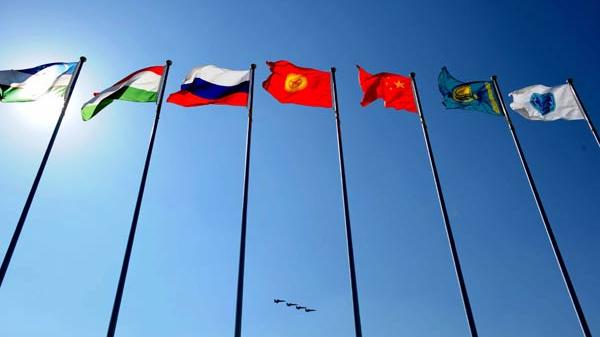
Editor's note: Djoomart Otorbaev is the former Prime Minister of the Kyrgyz Republic, a distinguished professor of the Belt and Road School of Beijing Normal University, and a member of Nizami Ganjavi International Center. The article reflects the author's views, and not necessarily those of CGTN.
Chinese Foreign Ministry confirmed last week that President Xi Jinping will attend the 20th meeting of the Council of Heads of State of the Shanghai Cooperation Organization (SCO) upon the invitation of Russian President Vladimir Putin. The meeting to be held on November 10 and will be hosted via video link by Russia, which holds the rotating SCO presidency this year.
Created as a regional security institution SCO became a truly global organization. Currently, it has eight full members, four countries have "observers" status, and six countries are currently the "partners on dialogue". Member countries occupy 65 percent of the earth's landmass and are populated by 3.3 billion people. Its combined GDP based on purchasing power parity reached the level with the countries of G7.
For the four Central Asian countries, which along with China and Russia are the founding countries of the SCO, the relations with their two big neighbors are critically important. In my recent article, I described recent events related to the change in Russian policy towards the countries of Central Asia. The relationship with China demonstrates similar positive developments.
On July 16 this year, China held their first meetings with the foreign ministers of all five Central Asian countries in the "5+1" format. From now on, Beijing will develop not only bilateral ties but also formally consider Central Asia as an integral region. Russia held a meeting in the same "5+1" format on October 16.
The N+1 format, where 1 is China, is not new to the country. On the one hand side it relates to the recognition of differences between different parts of the world, but on the other hand, relates to similarities of a particular region. Among the most well-known cooperation formats is 17+1 with the countries of Eastern Europe, and 11+1 with the countries of the ASEAN region.
I am sure that a 5+1 meeting between the foreign ministers will influence and bring clear benefits to all participants in the following at least four areas. First, all countries are going to work closer to each other to fight the current pandemic. China proposes the building of a China-Central Asia community of health and establishment of a notification mechanism on major communicable diseases, additionally to share preventive expertise.
Second, they will join hands to boost economic recovery and pursue closer cooperation. Countries will open their markets even deeper to each other, they would improve their respective business environment to facilitate more trade and mutual investment. Current and future transportation routes running through Central Asia should be modernized to strengthen international connectivity.

Planes fly over national flags of Shanghai Cooperation Organization (SCO) member countries during the closing ceremony of the Peace Mission - 2014 military drill in Zhurihe, north China's Inner Mongolia Autonomous Region, August 29, 2014. /Xinhua
Planes fly over national flags of Shanghai Cooperation Organization (SCO) member countries during the closing ceremony of the Peace Mission - 2014 military drill in Zhurihe, north China's Inner Mongolia Autonomous Region, August 29, 2014. /Xinhua
Third, countries will pay special attention to regional stability and security. China and Central Asian countries will deepen cooperation in fighting terrorism, separatism, and extremism. And fourth, they will strengthen multilateral coordination and promote justice and fairness. China and Central Asian countries should render each other firm support regarding sovereignty and security. Chinese Foreign Minister Wang Yi said that by establishing the mechanism of the foreign ministers' meeting, China and Central Asian countries will meet regularly and formulate cooperation plans to ensure the steady and long-term friendship between the countries.
Considering the inter-dependence of the regional economies the Chinese side declared its readiness to establish "green corridors" for the Central Asian partners to ensure uninterrupted cross-border freight traffic. The foreign ministers also discussed the possibilities of cooperation on such drivers of a modern world as digitalization, e-commerce, financial services, smart cities, as well as in other hi-tech areas.
Among new things, six ministers decided to strengthen a multilateral political dialogue. Economic relations under the Belt and Road Initiative and security ties under the SCO will now be reinforced by closer political relations. The creation of the new format is an expansion of China's traditional role and a signal of its readiness when needed to compete for influence in the region.
Even without ministerial meetings, new initiatives are born almost every day. For example, on June 5, China, Kyrgyzstan, and Uzbekistan opened a new multimodal transport corridor consisting of rail and road sections. The first 25 containers of electrical products were transported by train from Lanzhou to Kashgar, where they were loaded onto trucks to cross the Kyrgyz border at the Irkeshtam crossing point.
In Osh, they were again loaded onto trains and sent through to the territory of Uzbekistan. As the Chinese customs service informed, the journey took seven days - five days faster than through Kazakhstan - and was 295 kilometers shorter. China, Kyrgyzstan, and Uzbekistan have been discussing the establishment of a rail link through southern Kyrgyzstan since the late 1990s. Extraordinarily successful Eurasian rail corridor will lead to the further success of the southern rail route. Sino-Central Asian cooperation has enormous development prospects.
Is it an accident that the statements of China and Russia on Central Asia appeared almost simultaneously, and the content of the statements was similar? In my opinion, all this did not happen by chance. There was likely a fact of coordination of the positions between the two most important Central Asian neighbors. This observation is a clear positive development. The absence of neither political competition nor rivalry between China and Russia is particularly important for regional stability and security. Healthy cooperation in the SCO format is making its worthy contribution to this development.
(If you want to contribute and have specific expertise, please contact us at opinions@cgtn.com.)

